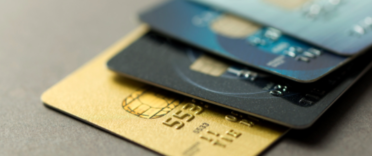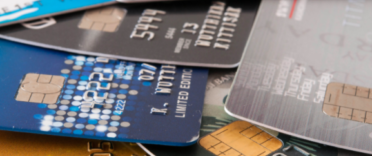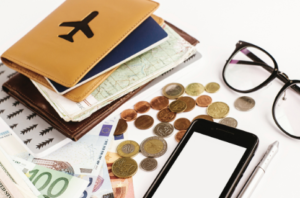 If you’re starting to plan a holiday or trip abroad, it’s important to consider your spending options carefully, particularly if you’re planning on taking a credit card with you. Many standard credit cards charge high fees for spending overseas and this can rapidly become expensive if you use your card regularly. It’s therefore worth looking for one that allows you to avoid paying these fees when you’re abroad.
If you’re starting to plan a holiday or trip abroad, it’s important to consider your spending options carefully, particularly if you’re planning on taking a credit card with you. Many standard credit cards charge high fees for spending overseas and this can rapidly become expensive if you use your card regularly. It’s therefore worth looking for one that allows you to avoid paying these fees when you’re abroad.
What is a travel credit card and how does it work?
Some credit cards - often referred to as travel credit cards - are designed specifically for spending overseas. This means they won’t charge you each time you use them abroad.
You can spend on your travel credit card wherever you are in the world (providing the retailer accepts credit cards), which makes this type of plastic ideal for those who travel frequently.
What’s more, all purchases that cost more than £100 and less than £30,000 will be protected under Section 75 of the Consumer Credit Act. This means that if the product you buy is faulty or not the same as the description, or if the retailer or trader goes bust, your credit card provider is jointly liable with the retailer and you can seek compensation.
Which travel credit card is best for you?
Money to the Masses uses Creditec*, an online comparison service that enables you to find credit card deals tailored to you without affecting your credit score. You will want to compare as many different options as possible before you get a new credit card, so it is a good idea to do a fast online comparison. With only a few basic details, the Creditec tool will build a personalised list of credit cards suited to your needs to help you navigate the huge number of options out there. You can then pick the result that suits you best. None of this will affect your credit score as the eligibility process uses a soft credit check. Click here to start your comparison*.
The best travel credit cards - January 2025
The table below shows the top 5 deals for travel credit cards:
| Provider | Foreign transaction fee | Cash withdrawal fee | Representative APR | Cash withdrawal APR | Extra features |
| Barclaycard Rewards Credit Card - Check eligibility | 0% | 0% (up to £500 a day) | 28.90% | 28.90% | Earn 0.25% cashback on your everyday spending. |
| Halifax Clarity Credit Card - Check eligibility | 0% | £0 | Will depend on your individual circumstances | Will depend on your individual circumstances | Halifax customers can order travel money online and get it delivered to their home |
| Bip Credit Card - Check eligibility | 0% | £0 | 29.9% | 29.9% | N/A |
| NatWest Credit Card - Check eligibility | 0% | 3% (minimum £3) | 12.9% | 12.9% | N/A |
Best travel credit card for rewards
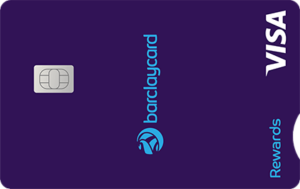
This is a good choice for those looking to earn something back as they spend. It offers 0.25% cashback on all purchases you make - but note this does not include balance transfers, money transfers, cash withdrawals, buying currency or traveller’s cheques. It also does not include gaming-related transactions such as gambling, betting or buying lottery tickets. In addition, you’ll be able to save money on live events with Barclaycard Entertainment.
To ensure you fully benefit from cashback offers, it’s important to pay off your balance in full each month. If you don’t, you’ll pay interest at a rate of 28.90% pa (variable) which could soon outweigh any of the card benefits.
Best travel credit card for cash withdrawals

This is the best option, as it does not charge a cash withdrawal fee. Keep in mind that withdrawing cash on holiday can be expensive. Most credit cards charge you interest from the moment you withdraw your money, even if you clear your balance that month and so you should avoid withdrawing cash from a credit card wherever possible.
Best travel credit card for a low rate
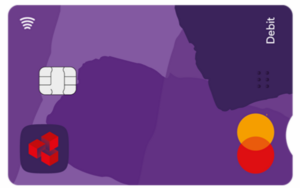
It is always best to pay off your credit card balance before the interest-free period ends, usually around 56 days on standard cards. However, if that is not a possibility, you should go for the lowest APR card available. The Natwest credit card is the lowest APR option amongst cards than do not charge a foreign transaction fee.
How to make the most of a travel credit card
The best way to make the most of a travel credit card is to ensure you are not paying to use your card and that you are maximising the rewards available to you. If you plan to take out cash, or want the option to be able to, you should make sure the card you take out allows you to withdraw cash for free. If you expect to spend a significant amount of money while you are away, think about the credit limit that your card will have.
Once you find a card that covers everything you need without charging you, it's time to think about how you can benefit from using the card. This could be through cashback on your spending, earning rewards points or benefiting from extra perks, such as airport lounge access or travel insurance.
It is also important to make sure that you are paying off the balance in full before the end of the billing period, usually 56 days. This will help you avoid expensive interest charges and fees that would otherwise quickly erode any benefits of using the card.
What to consider before you get a travel credit card
If you’re planning to use a travel credit card on holiday, it’s important to check the following before you apply:
- Are there any monthly or annual fees?
- Will you need to withdraw cash on your credit card and if so, how much will you be charged If you need to do this regularly, it is worth looking for a credit card that won’t charge fees or interest.
- Can you afford to pay off your balance in full every month? If not, it is worth looking for a credit card that offers 0% interest on purchases for a number of months.
- Is your credit score high enough to be accepted for the most competitive deals?
Whether a travel credit card is right for you will also partly depend on whether you can afford to pay back what you spend each month. Even though travel credit cards won’t charge you a fee for spending abroad, if you are unable to clear your balance at the end of the month, the amount of interest you’ll pay could make it an expensive option.
You’ll also need to consider your credit score - if your credit score is low, you’re unlikely to be accepted for the most competitive travel credit cards, in which case a prepaid card or debit card is likely to be a more suitable choice.
However, if you are careful about the amount you spend on your card and you have a good credit rating, a travel credit card can be a useful way to pay for excursions, restaurants and other expenses while you’re away and you’ll have the reassurance that all purchases you make will be protected under Section 75.
Pros and cons of travel credit cards
Pros
- Travel credit cards can be much cheaper than standard credit cards when used abroad.
- Some travel credit cards offer extra benefits such as interest-free purchases or cashback.
- Most travel credit cards offer competitive exchange rates.
- Purchases are protected under Section 75 of the Consumer Credit Act.
Cons
- Some credit cards charge monthly or annual fees.
- If you don’t pay off your balance in full each month, the amount of interest charged can be high.
- Although cash withdrawals are often fee-free, you’ll usually still be charged interest from the day of the transaction.
- You’ll need a good credit rating to be accepted for the best deals.
Alternatives to travel credit cards
If you’re not sure whether a travel credit card is right for you, there are a few other options to consider. We have outlined some of them below:
Debit cards
You could choose to take a debit card on your travels - but it’s important to choose one that won’t charge you for spending overseas. Here are five top options:
Starling Bank*
Starling Bank offers fee-free spending abroad as well as free cash withdrawals and you’ll get the Mastercard exchange rate. Note that the account must be operated via the app. For more information on Starling Bank*, read our independent Starling Bank review.
Curve*
If you open a Curve* account you can spend on your current debit and credit cards abroad without the extra fees. Opening a Curve account means you don't have to apply for an additional credit card for travel and can use your existing one instead. Simply choose which bank card or credit card to use abroad within the Curve app and you will benefit from the interbank exchange rate and little to no ATM withdrawal fees. Depending on which Curve card you have there are limits to how much you can spend and withdraw abroad for free each month. Find out more information on Curve in our independent Curve review.
Chase Bank
Chase does not charge a fee for using your card abroad and it applies the current Mastercard exchange rate purchases made in the local currency. For more information, read our independent Chase Bank review.
Monzo
If you open a Monzo bank account, you can use your debit card anywhere in the world for free and again, you’ll get the Mastercard exchange rate. ATM withdrawals are fee-free in the European Economic Area (EEA), while in other countries you can withdraw up to £200 for free every 30 days (£600 with Monzo premium). After that, you’ll be charged a 3% fee. Again, the account needs to be operated via the app. For more information on Monzo, read our independent Monzo review.
Virgin Money
If you have a Virgin Money bank account you won’t be charged for using your debit card overseas. There are no fees for foreign transactions and no fees for ATM withdrawals. What’s more, the account also offers interest at 2.02% AER on credit balances up to £1,000.
Prepaid travel cards
Unlike credit cards, prepaid travel cards allow you to load them up with cash before you set off on holiday and you can then spend on them in the same way as a debit card. If you get low on funds, you simply top up again.
Prepaid cards can be a good option if you are on a budget as you will only be able to spend what’s on the card and, because you’re not borrowing money, there’s no interest to pay. Credit checks are not usually carried out either (although there may be an identity check), so they can be a good choice if you have a poor credit score.
Some prepaid travel cards require you to load them with foreign currency such as euros or dollars, depending on where you’re travelling to. Others enable you to spend in several different currencies on the one card. Just keep in mind that car hire firms, petrol stations and some hotels often won’t accept prepaid cards.
Below we have listed the top three prepaid travel cards to consider:
Revolut
Digital bank Revolut offers a prepaid currency card that offers fee-free spending abroad in more than 150 currencies at the interbank exchange rate. This is the rate that banks offer to each other when exchanging currencies and it is more competitive than the rate offered by most other prepaid cards.
You can exchange money for free on weekdays, so long as you exchange no more than £1,000 a month (this is down from the previous £5,000 a month). Anything over this is charged a fair usage fee of 1%. There is also a 1% mark-up for exchanging uncommon currencies and at the weekend when foreign exchange markets are closed.
Cash withdrawals are free up to £200 a month - anything over this will be charged a fee of 2%. To read more about Revolut, check out our full, independent Revolut review.
Caxton FX
Caxton FX offers a prepaid currency card that can be loaded up with 15 different currencies. If your chosen currency is not there, you can load the card in sterling and it will be converted to the local currency when you spend. There are no foreign transaction fees and no ATM fees when you use your card abroad.
Travelex
Travelex offers a prepaid Money card that allows you to choose between 15 different currencies. There is a fixed exchange rate at the time of buying the currency but there are no foreign transaction fees and no ATM fees when you use your card abroad. You can use the Travelex app to check your balance and top up the card, although limits may apply.
If a link has an * beside it this means that it is an affiliated link. If you go via the link Money to the Masses may receive a small fee which helps keep Money to the Masses free to use. The following link can be used if you do not wish to help Money to the Masses or take advantage of any exclusive offers – Starling Bank, Curve





